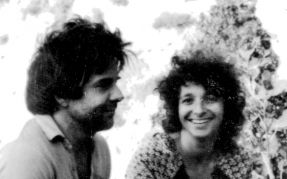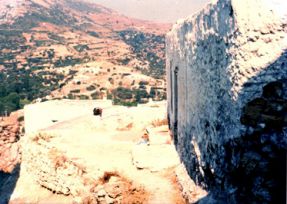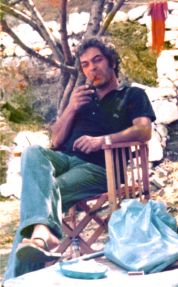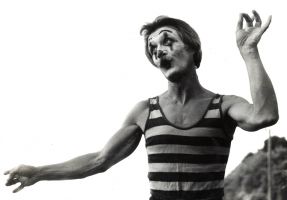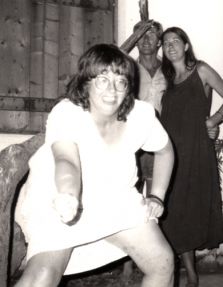Our Story
In the Direction of our Hopes
By Yannis Andricopoulos. See also Dina Glouberman's story
The idea popped up one evening out of a bottle of wine and flashed without warning on our brain. We were chatting at the time with a good old friend. Why not take Dina's personal growth groups from cloudy Golders Green to the gold and green of a sunny Greek island? Wow! Why not? Let's have a go! The claims of the unexpected had been fully vindicated. The thought that this might be the beginning of a venture to be celebrated a good forty years later had never crossed anybody's mind.
I flew to Greece immediately and started looking for a suitable location. Skyros was my fourth stop. The right place, neglected by time, shy of foreigners and innocent as the moonlight, had been found. With hastily borrowed money, a hundred-year-old derelict house, formerly a school, was bought. It was rebuilt, except that, when myself and Dina, with two babies in our arms, arrived for the opening of the Skyros Centre, the building was still receiving the finishing touches – the fitting of windows and doors, for example. Somehow in the end the builders managed to deliver a half usable house. Thankfully, the litigation culture had not taken root as yet.
Personal growth at that time often seemed to ivolve the unleashing of primal screams. Unfamiliar with such therapeutic techniques, the neighbours' conclusion was that what had been established on their island was either a torture chamber, a mental home or a sadomasochistic clinic. In their kindness, they often rushed in bravely to save the 'victims'.
'No! Don't worry- it's all play. A kind of theatre.'
'Oh good. When are you going to perform?'
At the end, there had to be an impromptu, if somewhat incongruous performance, in Brooke Square, high above the village. That was the first ever Skyros cabaret, the predecessor to those which have rounded off virtually every session ever since.
The Skyros Centre, known in town as either the English Villa or the Madhouse, terms interchangeable as if they meant one and the same thing, instantly became a resounding success. The venture – powerful human bonds, fantasy parties, romantic meals by the sea, extraordinary coincidences, apocalyptic dreams – captured the imagination and gave people an emotional home. In fact, 'It was more like home than home', said Monica from Vienna. Those sentiments have been echoed ever since.
Belief in its purpose and trust in its methods ran so deep that when the administrator mistakenly accommodated the wife of one couple with the husband of the other, the two couples gamely accepted it, for it must have had a purpose. The venture had crossed the horizon.
The Atsitsa Club, as it was then called, appeared five years later. An announcement on an A3 sheet. read: 'President Reagan has let it become known that he does not intend to join Atsitsa & its programme,' a close aide said. 'It's not exactly to his taste because it doesn't include war games which the president loves to play.' The humour went slightly amiss, Skyros was even criticised for inviting Reagan, and the sheet was reprinted!
The scope Atsitsa had for experimentation was far more bewildering. The concept of holism had not moved as yet outside the premises of alternative medicine, and the physical difficulties in running the place were immense. Access to it through a treacherous dirt path was a hazardous affair, and all the things taken for granted in cities – mains electricity, running water, telephones or a sewage system – were things of the future. Some of them still are. The outside toilets had no doors, the showers no curtains, and rumour had it that the first guests built their own huts.
Guests who came looking for tennis courts did of course complain. But usually everything was taken in the best of spirits. After all, Atsitsa was the Wild West of Skyros, and the guests felt like pioneers. In addition, self-discovery, creativity, camaraderie, craziness and often an outrageous sense of humour all contributed to an unforgettable experience that hardship could only enhance. Blending facts – naked midnight swims or summer solstice toga parties – with fantasies, in which there were beds sleeping 30, created, meanwhile, another focus for local modern mythology.
As time went on, conditions improved dramatically. But Atsitsa, true to herself, remains untamable, which is its overriding allure. Indeed, anything different would have impoverished the richness of its stories and robbed many of their most treasured memories. Meanwhile, the island itself developed a taste for tourism and the money it brings. Roads were sealed, hotels built, nightclubs and restaurants mushroomed and East European immigrants arrived. The Internet Cafe now electronically signposts a new era for the island. The locals changed, too, as trends, like gravity, can be resisted only so long. The young men frequent clubs rather than tavernas and drink whiskey rather than local wine. Young women are as fashion-conscious as their counterparts in London's Knightsbridge.
Yet the magic of the island has not dissipated into the thin air of globalism. A prejudiced pride in its past and a stubborn commitment to its Greekness would not allow for it. At any rate, even if desired, an up-to-date unconscious cannot be acquired.
The Centres also changed. The level of organisation and creature comforts simply had to rise from the laid-backness of the sixties. Into the fold came Skyros-in-Tobago and then Skyros-in-Thailand. But the guests changed too. Rather than representing the fringe of society, they are now mainstream people, many of them, indeed, leaders in their fields. The 'alternative' has won respectability. Yet for Anne, a 1979 Skyros Centre participant who returned after 24 years, the spirit of the place had not changed a bit. Skyros' soul had successfully resisted the market's designer spirituality.
What keeps the Skyros balance in place is its ethos and also its community structures. Workgroups, for example, are still encouraged because work, as the poet said, is 'love made visible' – it is what creates community. Demos, the daily gathering of the whole group, is still a cornerstone of community life, as are co-listening and Oekos, both now essential components of the Skyros tradition.
Likewise the spirit of innovation is ever-present. Though everything may appear settled, nothing is – the creation of Skyros is taking place daily. New ideas, whether spectacularly successful or dismally ill-conceived, flow in constantly and turn the place into the imagination's workshop.
Special mention should be made here of the 'auction of promises' - a somewhat quirky event with a Midas touch raising about £18,000 in support of local projects, and the half-marathon, initiated by members of the Atsitsa staff, which did become at one point one of the island's main annual events. More funds were raised and made available since the financial crisis hit Greece for the purchase of diesel to heat the island's nursery, primary and secondary schools and its health clinic, to help individual families in need or societies for the protection of animals. Additional help was offered to the health clinic to buy much needed supplies and also to cover the cost of an extra nurse needed during summer time.
The links the Centres have developed with the local community are of paramount importance. If it is not to be a force of destruction, tourism has to act as a bridge between the locals and the visitors that is beneficial to both sides. It must also rest on respect. Although wealth is not, the gift of wisdom – just like light – is equally distributed amongst all peoples of the world.
Skyros was founded on hope – the hope that one can be true to his or her own self within a world that makes sense. It is still travelling in the direction of that hope.
------------------------
‘Welcome to the world of honouring, empowerment, openness, issues, respect and concern.’ Hugo Williams, Times Literary Supplement
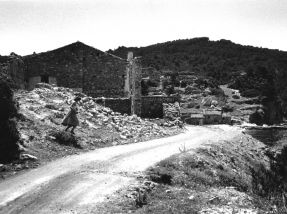
|
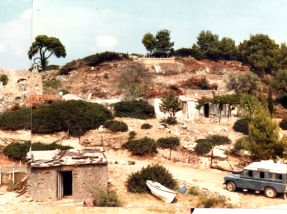
|
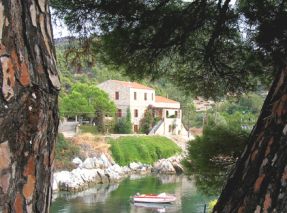
|
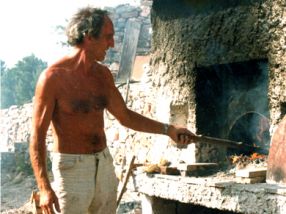
|
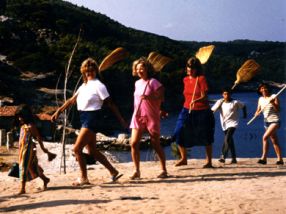
|
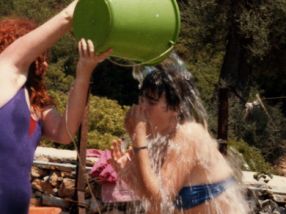
|






